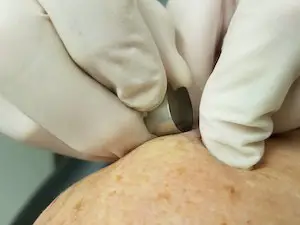What Does it Cost to See a Dermatologist?
 Making regular visits to a dermatologist is necessary for some people. If you’ve never been to the dermatologist and suddenly a need arises where you need to schedule a visit, you may be wondering how much the visit will cost. Does a dermatologist take insurance? Does insurance even cover treatment for skin conditions?
Making regular visits to a dermatologist is necessary for some people. If you’ve never been to the dermatologist and suddenly a need arises where you need to schedule a visit, you may be wondering how much the visit will cost. Does a dermatologist take insurance? Does insurance even cover treatment for skin conditions?
So, what does it cost to see a dermatologist? The average charge for one dermatologist visit is $200 if you don’t have health insurance. With health insurance, you may be able to get the majority of the charge covered. Dermatologist prices can vary depending on location, specialty, and other competition within the area.
While you may be apprehensive to visit the dermatologist due to the cost, the health of your skin is important. By visiting the dermatologist when you should, skin conditions can be diagnosed and treated early on, saving you from a lot of pain and insecurity down the line. To learn more about the prices of visiting a dermatologist, keep reading.
What Determines the Cost of Your Dermatologist?
The price of your dermatologist visit will be determined by a few different factors. It’s important to keep these in mind when looking for a dermatologist.
Do You Have Health Insurance?
Whether or not you have health insurance will play a big part in determining how much you’re going to have to pay at your dermatologist visit. If you’re insured through a major insurance carrier, the insurance payment will most likely be accepted. If you have health insurance, the amount you have to pay at the dermatologist will be determined by the insurance plan and premium that you have. Contact your insurance provider beforehand to see what they offer.
If you don’t have health insurance, you can expect to pay a much larger sum when it comes time to visit the dermatologist. While one dermatologist visit only costs a few hundred dollars, that number can quickly become larger if you require treatment or procedure.
Before you decide on what dermatologist you want to use, ask whether or not they have a payment plan. A payment plan will allow you to pay your dermatologist bill over the course of a few months to help ease the burden of the charge.
Talking about health insurance and what it does and does not cover, check out our article, Can My Health Insurance Cover a Massage?
Where is Your Dermatologist Located?
Dermatologist prices can vary based on their location. This can apply nationally and locally. Dermatologists will naturally be more expensive in areas where the cost of living is higher. You can expect dermatologists on the West Coast and the East Coast to be much more expensive compared to dermatologists in the South and the Midwest of the United States.
At a smaller level, a dermatologist providing services in a rural area may be cheaper compared to a dermatologist located in the city. A dermatologist in the city probably has many more patients compared to a rural dermatologist.
Are You Visiting a Specialized Dermatologist?
Do you have a skin condition that requires specialized care? There are different types of dermatologists; a general dermatologist has experience treating common skin conditions and providing guidance on how to take care of your skin. A specialized dermatologist focuses on certain types of skin conditions. By visiting a specialized dermatologist, you can get more effective treatments and guidance.
A specialized dermatologist visit will cost more than a general dermatologist visit. As with any field, the more specialized it gets, the more expensive it gets. A specialized dermatologist will be able to pinpoint the cause of your skin condition and provide you with effective treatments much more easily than a general dermatologist could.
If you need to visit a dermatologist but you’re having difficulty choosing one, click here to read 5 Tips for Choosing the Right Dermatologist.
Is Dermatologist Competition High In Your Area?
As you look for a dermatologist, do there seem to be many dermatologist’s offices in your area? When there’s more competition, you’ll have more options in choosing a dermatologist that provides services for a good price. If there is little to no competition, your options will be limited.
If you live in an area where your options are limited, try expanding your search to nearby towns and cities. While you may have to travel a little way, you could potentially save a lot of money.
If you do choose a dermatologist that’s a little farther away, the drive time will give you a lot of time to think. Read our article, How Do I Maintain My Brain’s Health? to learn how you could use this time wisely.
How Often Should You Visit the Dermatologist?
You should visit the dermatologist at least once a year, even if you don’t have any known skin condition. The main reason for visiting the dermatologist once a year is for preventative care. Skin cancer is the most common type of cancer there is; while treatment has a high success rate, the later it’s diagnosed, the bigger the problem you’ll have.
By visiting the dermatologist once a year, you’ll be getting a thorough skin exam. Anything that looks unusual to the dermatologist will be biopsied and tested. If you have a known skin condition, you may visit the dermatologist much more throughout the year.
What Happens at a Dermatologist Appointment?
If you’ve never been to a dermatologist appointment before, you may be wondering what exactly happens. Keep reading to learn what you can expect from your dermatologist visit.
Medical History
 When you first get to the dermatologist’s office, you’ll be asked to fill out a form about your medical history. While some of this may not seem important, your skin can be affected by the most minute things. If the doctor has a clear and thorough record of your history, it will make it easier for them to diagnose your skin condition.
When you first get to the dermatologist’s office, you’ll be asked to fill out a form about your medical history. While some of this may not seem important, your skin can be affected by the most minute things. If the doctor has a clear and thorough record of your history, it will make it easier for them to diagnose your skin condition.
Believe it or not, but some skin conditions are hereditary. Skin cancer, acne, psoriasis, and lupus are all hereditary skin conditions. (You can learn more about psoriasis here.) For this reason, the dermatologist may ask you to verify your parent’s medical history if known.
Personal History
Don’t be freaked out if your dermatologist starts asking you personal questions. Your daily routines, energy level and activities can play a big role in the condition of your skin. A dermatologist will want to find the root of your skin condition; what caused it and where did it come from. They aren’t asking you personal questions to be nosy, but to try and figure out what is causing the condition.
Skin Exam
Your dermatologist visit will include a full-body skin exam. Your skin is the largest organ you have, so it’s important that it is thoroughly examined. This part of the visit can be the most nerve-wracking for those who have never visited the dermatologist, but it is necessary to know the health of your skin.
As the dermatologist does the skin exam, they may use certain tools to better examine your skin. A magnifying glass will be used to help the doctor examine areas of your skin more thoroughly. A special light will also be used so that the dermatologist can see the condition of your skin.
 Skin Biopsy
Skin Biopsy
If the dermatologist finds something on your skin that they aren’t familiar with or looks as if it may be linked to skin cancer or another skin condition, they will do a biopsy. A biopsy is when the doctor takes a sample of the skin and sends it away to be tested. This is the most effective way to get a diagnosis.
Just because you have a biopsy doesn’t mean you need to start panicking. It’s important to think of a biopsy as part of the treatment process for your skin condition; the first step of treatment is finding out exactly what you’re supposed to be treated for.
If you get a biopsy done, it will take a few days to get the results back. The dermatologist’s office will contact you once they have the results to discuss the results of the biopsy.
We hope this article was helpful in preparing you for your dermatologist visit. We have many articles geared to answering questions that you can’t seem to find an answer.
This article was sponsored by Skin Care Physicians of Georgia, a dermatologist in Macon, GA. They specialize in a wide range of skincare solutions, from acne treatments and MOHS surgery to beauty aesthetics. You can visit their Macon Dermatologist website here.

